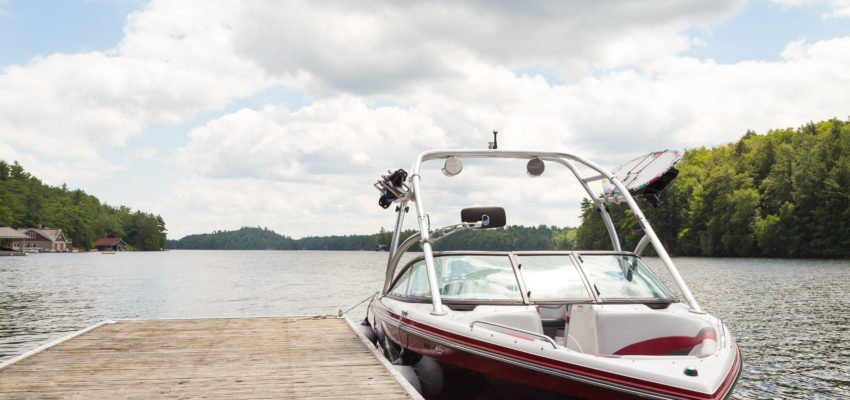Why Having Boat Insurance Matters

It’s almost that of year to get on the water, feel the sun on your skin, and build cherished memories with family and friends. Boating is some of the most fun you can have on the water, and it’s important to do everything you can to protect you and your passengers.
Boat insurance may help cover a motorboat, sailboat or personal watercraft if it’s stolen, in an accident, or damaged by a covered peril like fire or lightning. Boat insurance may also help protect you if you accidentally injure someone or damage their property with your boat.
Even if boat insurance isn’t required in your state, purchasing a boat insurance policy can help you keep your head above water should the worst happen.
Do I need Boat Insurance?
While some states require boat insurance and some do not, if you dock or finance your boat, you may require coverage. And even if your state, marina, or lender doesn’t require boat insurance, it’s important to consider what may happen if you don’t have coverage. In the event an accident occurs, you could be fully responsible for any repairs or liability to others. Not to mention medical costs if any of your passengers are injured.
Regardless of how safe you try to be on the water, it’s always best to ensure you, your family, and your fellow boaters are protected in the event something goes wrong.
What does Boat Insurance cover?
Like car insurance, boat insurance has several coverage types, and it’s important to discuss your options with your agent. The size, type, and value of your craft and where you use it may affect what type of insurance you choose.
- Small crafts may be covered under a standard homeowner’s policy or renters insurance policy. For example, canoes, small sailboats, or small power boats may be covered for property damage. It’s important to note that liability coverage is not typically included, but may be added to some homeowners policies.
- Larger boats, yachts, and even personal watercrafts like jet skis, often require a separate insurance policy.
Common and optional types of boat coverages include:
- Physical loss or damage to the vessel itself, including hull, machinery, fittings, furnishing, and permanent equipment. Some exclusions may include normal wear and tear, damage from mold, animals, invasive species like zebra mussels, and defective or damaged machinery. This is why it’s always important to speak with your agent and get clarity on exactly what is and isn’t covered by your policy.
- Trailer or boat accessories.
- Theft of the vessel itself.
- Injury to passengers or any persons who aren’t the boat owner or their family.
- Damage caused to someone else’s property.
- Medical payments for the boat owner and other passengers.
- Towing after an accident.
- When it comes to loss or theft of belongings on the boat, you may or may not be covered. A homeowners policy may provide coverage, but you should ask your agent specifically about any gear and equipment you keep on the boat (like fishing equipment) to make sure it’s covered.
Note that while boat insurance generally provides broader liability coverage than a homeowner’s policy, you may also need to consider purchasing an umbrella liability policy. This provides additional coverage for boat, home, and car.
How much does Boat Insurance cost?
Many factors can influence and even reduce the cost of your boat insurance. Some common factors include:
- Your safety record. It’s always a good idea to practice safe boating in general, but did you know that the more years you spend without a boating accident or citation, the less you’ll pay for boat insurance
- Homeowners discount. You may be able to get a lower rate on your boat insurance policy if you own a home. This discount may also come as part of a bundle.
- Payment structure. Based on how you pay your boat insurance—monthly, a few times a year, or annually in one lump sum—you may get a better rate.
- Boat age. This one may surprise you. While newer boats can be more expensive to insure (similar to car insurance), a used boat may not save you money when it comes to insurance. Boats that have only had one owner may get a better rate, which means it may be a better idea to hold on to an older boat and make repairs instead of replacing it.
Other ways to lower the cost of boat insurance may include bundling multiple policies, like boat and auto insurance; having Coast Guard-approved fire extinguishers; completing boating and water safety courses, and more. Always ask your agent about what discounts are available to you.
How do I purchase Boat Insurance?
Contact a local Bearingstar agent today to see what policies and options will work best for you. We are here to answer your questions and discuss your insurance options. Our goal is to be sure you have the best coverage for you and your loved ones.
Call us at 877-801-7424 in Massachusetts, and 888-519-9996 in Connecticut.
Sources:
- Boat insurance and safety. Insurance Information Institute. https://www.iii.org/article/boat-insurance-and-safety
- Boat Insurance Guide: Costs & Coverage. Discover Boating. https://www.discoverboating.com/ownership/insurance
- What to Expect from Average Boat Insurance Prices. Better Boat. https://betterboat.com/blogs/boating/average-boat-insurance
